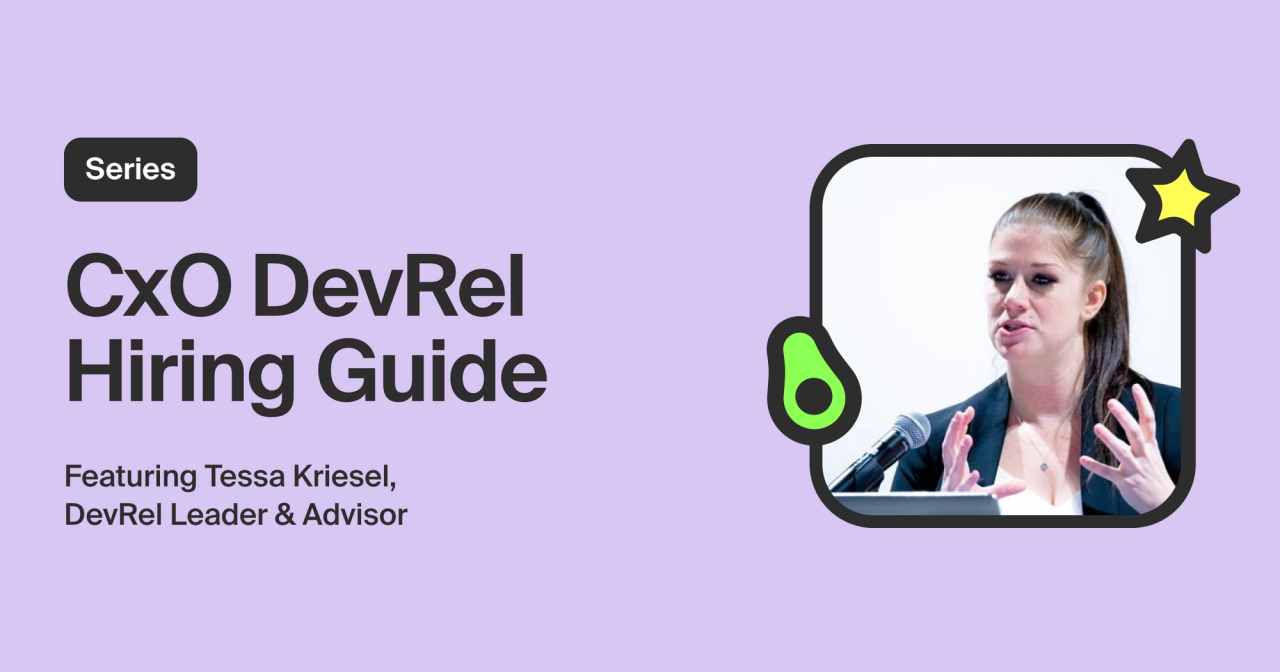Over the summer, I spent a lot of time speaking to investors and CEO's of early-stage startups. They were looking for their first DevRel hire and were excited about the impact this hire could bring.
They're not wrong; having a DevRel function is usually necessary, especially for developer-first companies. However, hiring a single Developer Advocate—experienced or not—isn't going to drive the impact most were hoping for.
Don't get me wrong, a Developer Advocate can drive incredible impact for your company if the alignment is there.
Where the failure comes in is when stakeholders believe that a single Developer Advocate can do it all. Successful Developer Relations programs consist of four major pillars: developer marketing, education, experience, and community. In most large companies, each of these pillars is an entire function with an executive leader and a team.
We haven't even touched on the fact that your DevRel program should also ensure it has strong relationships with your marketing, engineering, product, sales, and customer success stakeholders. #meetinglife is an understatement when you have to keep tabs on each of the needs and priorities of these internal stakeholders.
You're also seen as the voice of the company to your technical users, so stepping away for a vacation or changing jobs can be daunting.
What Developer Advocates need to succeed
Proper reporting structure and company alignment
This topic is a blog post all in itself, but I won't go into that detail now. What you should be thinking about though is the focus of your DevRel function and who can best support that focus.
I mentioned the four pillars of a DevRel program above—consume that information and think about what your DevRel program can do to drive the biggest impact.
Things to consider when deciding reporting structure:
- Who understands your developer audience best?
- Who can provide the right insights around company goals and priorities?
- Who understands how technically-minded users think?
- Who can help them build key relationships across the org?
- Are you a developer-first or developer-plus company?
For the first time in my career, I reported to Customer Success, and I may be biased when I say this, but it's by far my favorite function to report to. Customers are at the forefront of DevRel and targeting developers is all about education over promotion.
In developer-first companies, I strongly believe that your DevRel function should report directly to your CEO. They need to understand the high-level company priorities and struggles, deeply. Another function in larger developer-plus organizations that should be on your executive team is community—which can be a great reporting function for DevRel as well.
Support with stakeholder relationships
As I shared above, DevRel needs to understand the priorities and goals of many internal functions. I currently find myself in 7-8 different team meetings at any given time in order to obtain the proper knowledge and understanding to drive the biggest impact for the entire company. If you're a small-stage startup, this is less daunting, but if you're at an 800+ person company (or larger!), it's exhausting and time-consuming.
Executives and key stakeholders should be considering how they can best support their DevRel function and ensure they're providing the insights they need for success without having to attend all of your team meetings.
Opportunities to be the voice of your technical users internally
Give your Developer Advocate or DevRel team the stage and voice to advocate for your technical users internally. Ensure stakeholders understand their role and the insights they can provide to the company if given the right opportunities.
A great idea for this is to give them time at your company all-hands on a recurring basis to share the sentiment and feedback from your dev users.
You can also ensure that your product team is considering the user feedback captured and providing opportunities for your technical users to review your product roadmap and drive decisions before they're final. Especially if you're a developer-first company. Developers are wicked smart, let them drive your product growth when it makes sense.
Proper budget and resources
If you take anything away from this blog post, it should be this: a single developer advocate can drive impact, but they can also easily get burnt out because they're constantly pulled in so many directions.
If your developer advocate or DevRel leader asks for support through budget requests or headcount, take their request seriously.
I coach many developer advocates who are getting pulled into 10-15 different projects at any given time. How is someone supposed to drive the greatest impact when they're spread too thin to even do their best work on a single project?
When these coaching situations arise, I usually request a coaching session with the CEO or whoever is leading the developer advocate. The developer advocate is not failing, the leader is.
Keep laser-focused for the win
Keep your goals laser-focused so they can successfully prioritize the requests they receive from you, internal stakeholders, and your technical users to focus on what truly matters and drive the biggest impact for your company.
This article was originally posted on Devocate, which joined the Common Room family in August 2022. For more developer relations insights and resources, check out the Common Room blog. Learn more about Common Room’s solution for DevRel teams if you're looking for an intelligent community growth platform to educate, empower, and enable your community.
